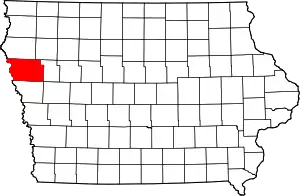Morningside College
Morningside College is a private liberal arts college affiliated with the United Methodist Church and located in Sioux City, Iowa. Founded in 1894 by the Methodist Episcopal Church, Morningside College has 21 buildings on a 68-acre (280,000 m2) campus in Sioux City (area population 143,157 in 2008.[3]). The Morningside College Historic District, which includes most of the campus, is on the National Register of Historic Places.
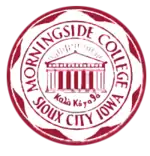 | |
| Type | Private |
|---|---|
| Established | December 5, 1894 |
| Affiliation | United Methodist Church |
| Endowment | $46.3 million (2019)[1] |
| President | John C. Reynders |
Academic staff | 65 |
| Students | 2,000+ full-time |
| Location | , , United States 43° 31′ 36.7″ N, 96° 44′ 13.3″ W |
| Campus | Urban 100 acres (0.40 km2) |
| Colors | Maroon and White |
| Nickname | "Mustangs" |
| Affiliations | NAIA – GPAC |
| Mascot | The Mustangs |
| Website | www |
Morningside College Historic District | |
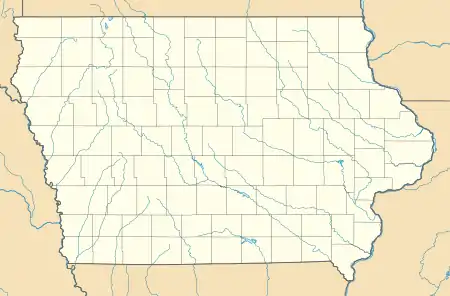  | |
| Location | Roughly bounded by Vine, Morningside, Garretson, Peters, and S. Paxton Aves. and Sioux Trail |
| Coordinates | 42°28′28″N 96°21′42″W |
| Area | 41 acres (17 ha) |
| Architect | Charles P. Brown |
| Architectural style | Romanesque Revival Late 19th and 20th Century Revivals |
| NRHP reference No. | 97000387[2] |
| Added to NRHP | May 14, 1997 |
History
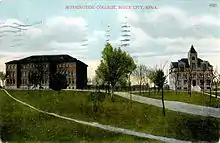
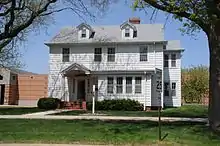
A group of Sioux City business leaders and Methodist ministers established the University of the Northwest in 1889 to provide educational, cultural and economic growth in the community.[4][5] The location of the campus was the northern section of the farm of Edwin C. Peters, the founder of the suburb of Morningside. The university was plagued with financial problems, and it became a victim of the financial Panic of 1893. It closed in 1894, the same year that the Methodist Episcopal Church incorporated Morningside College and took over the campus. Charles City College in Charles City, Iowa, was a German Methodist college that was absorbed into Morningside College in 1914.[6]
Historic district
Part of the campus has been set aside as a nationally recognized historic district that was listed on the National Register of Historic Places in 1997.[2] At the time of its nomination it contained 26 resources, which included nine contributing buildings, one contributing site, five contributing objects, nine non-contributing buildings, and one non-contributing object.[4] The focus of the district is a broad hilltop that overlooks the Missouri River valley. Charles City College Hall (1890), Lewis Hall (1900), the Vice President's House (pre-1914), Hickman-Johnson-Furrow Library (1914), Lillian Dimmitt House (1921), Dimmitt Residence Hall (1926), Jones Hall of Science (1948), Alice Gymnasium (1949), Roadman Hall (1953), and O'Donoghue Observatory (1953) are the contributing buildings. The contributing objects are The Spoonholder (1908), a curved cement bench with footpad and backrest; Class of 1922 Sundial; and the three Harmony Lane Lampposts. Bass Field, used for athletics, is the contributing site. This is the largest concentration of educational buildings in Sioux City, and it also contains some of the best examples of Richardsonian Romanesque, Italianate, and Moderne architecture in the city.[4] The district is also inextricably linked to the Morningside neighborhood, which was developed as a streetcar suburb. When the University of the Northwest was being developed there was a conscious effort to pattern it and the neighborhood after Northwestern University and Evanston, Illinois.[4]
Athletics
Morningside College teams are known as the Mustangs (formerly known as the Maroon Chiefs). The college is a member of the National Association of Intercollegiate Athletics (NAIA), competing in the Great Plains Athletic Conference (GPAC). The Mustangs formerly competed in the National Collegiate Athletic Association (NCAA) Division II level, primarily as a member of the now-defunct North Central Conference (NCC) until the 2000-01 season.
| Sport | Men's | Women's | Co-ed |
|---|---|---|---|
| Baseball | |||
| Basketball | |||
| Bowling | |||
| Cross Country | |||
| Football | |||
| Golf | |||
| Lacrosse | |||
| Soccer | |||
| Softball | |||
| Swimming | |||
| Tennis | |||
| Track and field | |||
| Volleyball | |||
| Wrestling |
The Lady Mustangs Basketball team won back-to-back NAIA Division II National Championships in 2004 and 2005. They also won the National Championship in 2009 with an undefeated 38-0 record. Most recently, the Lady Mustangs won the National Champsionship in 2015 with a 37-1 record. Morningside's Jake Stevenson won the NAIA 184 lb (83 kg) Wrestling Championship in 2007, and John Sievert won the 197 lb (89 kg) Championship in 2013. The football team was coached from 1948-1950 by Pro Football Hall of Fame coach George Allen.
The current football coach is Steve Ryan.[7] In 2018, Ryan guided the Mustangs to an undefeated 15-0 season. The team was named national champions after they captured the 2018 NAIA Football National Championship. In 2019, the Mustangs again went undefeated, becoming back-to-back winners in the 2019 NAIA Football National Championship
Student life
Morningside College is on a 68-acre (280,000 m2) campus in the residential neighborhood of Morningside in Sioux City, Iowa. Student organizations include: student government, honor societies, service groups, religious organizations, musical ensembles, student publications, and three national fraternities ( Alpha Omicron Pi women's sorority, Delta Sigma Phi fraternity, and Acacia). The campus is also home to two nationally renowned music fraternities, Phi Mu Alpha Sinfonia (men's) and Mu Phi Epsilon (co-ed nationally, but strictly women for this campus). Morningside's Department of Mass Communications has a weekly newspaper, the Collegian Reporter, it shares a public-access television cable TV channel 12 as MCTV, and operates a radio station 24 hours a day at 92.9 on the FM dial, KMSC.
Residence halls
Dimmitt Hall is the third oldest building on campus. It was named for Lillian Dimmitt, the 26-year Dean of Women.[8] Dimmitt Hall shares that namesake with the Lillian Dimmitt Alumni House, Dimmitt's former residence renovated for meeting and office space. A second renovation of Dimmitt Hall followed in the second half of the century producing the notable wings on either side of the primary structure.
Roadman Hall was built in two phases in the mid twentieth century. It houses about 150 students, mostly in double occupied rooms, but with several apartments as well. The dormitory is named after the longtime president of the college, Dr. Earl Roadman (1936–1956).[9] The newer wing of the building, Roadman South, was renovated and reopened in 2005. Unlike the rest of Roadman, it has air conditioned facilities.
The Residence Complex, or "Plex," was constructed in 1966 as a temporary housing for the construction crew employed to build Eppley Auditorium. The facility served a unique set of students and has since been home for many of Morningside's students.
In 2005, two apartment-style dormitories opened for upperclassmen, the Waitt and Poppen Halls. Between the two buildings a maximum of 72 students may hence reside. These buildings surround a central courtyard that serves as an additional functional meeting space for parties, celebrations, and student activities. Overlooking this green space is a clock tower with seating beneath.
Lags Hall, the third apartment-style living facility completed the apartment courtyard design in 2007. It has single-occupancy rooms and a leadership theme.
Recent additions
In 2005, the Hickman Johnson Furrow Library was renovated to include the Spoonholder Coffee Bar, Academic Support Services Center, and new seating editions. The library's print holdings were reviewed to weed out the oldest, outdated sources, making room for additional study places.
One of the newest additions to Morningside's campus is located at its heart. In 2005, the decision to replace the campus' central parking lot and existing maintenance facilities with a grand central campus green space and new maintenance facilities was made and passed by the Board. A $26 million capital fund-raising campaign began to raise the money needed for a major set of renovations and new construction.
The first addition came in the form of the central campus Hilker Green Space. Work began in the Summer of 2006 and it opened in late Summer of 2007. The space is designed as a split-level area featuring the grand two-level Lieder Family Fountain. Walkways and a 10-foot-wide (3.0 m) access path cut through the upper-lawn making their way by Lewis Hall connecting the Hickman Johnson Furrow Learning and Olsen Student Centers. The lower level features the Kline Family Pergola, an overlook allowing views of Bass Field, the apartment complexes, all the way to Dimmitt Hall and Olsen Stadium on the other side of campus. Near Eppley Auditorium, the new Buhler Performance Outdoor Performance Center has outdoor seating and is home to many productions.
A softball complex was added in Fall 2005, occupying the south third of Bass Field. The maintenance facilities, added to the Southeast end of campus feature a facility capable of servicing many of the campus' needs including the print shop and mail center and a parking lot. The last addition came in the form of a new South End parking lot that sits atop the old maintenance facilities.
At the same time, the Olsen Student Center underwent several renovations. The first replaced the old Randolph Room (a center for business, banquets, award recognitions, and orientation activities) with the modernized Yockey Room. The facility features a state-of-the-art multi-media setup. Outside of this room, a conference facility was added to allow for business meetings and public relations luncheons. The final renovation came to the campus' cafeteria and security facilities on the top level. The cafeteria now features booth, counter, and table settings, new food area offerings, and LCD televisions broadcasting campus events. The dish washing facilities, offices, and food preparation areas have all been redesigned. The security office was placed in the old security administrator's office at the building's entrance.
Notable alumni
- Kory DeHaan, MLB outfielder[10]
- Pauline Phillips and Eppie Lederer, identical twin sisters of the notable newspaper columns "Dear Abby" and "Ask Ann Landers", are Morningside College alumni. Known as the "Friedman twins" during their time at Morningside, they wrote for the school's long-running newspaper, the Collegian Reporter.
- George Everett "Bud" Day, a retired colonel in the United States Air Force and recipient of the Medal of Honor.
- Al McIntosh, editor who was featured in Ken Burns' The War.
- Paul Splittorff, pitched for the Kansas City Royals from 1970 to 1984.
- Matthew C. Harrison, 13th and current president of the Lutheran Church–Missouri Synod.
- Daryl Hecht, Justice of the Iowa Supreme Court.[11]
- Utu Abe Malae, Gubernatorial Candidate for American Samoa.
- Herb McMath, NFL defensive tackle[12]
- Ira N. Gabrielson, first director of the U.S. Fish and Wildlife Service.
- Jerry Johnson, NFL player.
- Emory Parnell, actor of stage, film, and television.
- Samuel A. Stouffer, sociologist.
- Harry E. Siman, member of the Nebraska State Senate.[13]
- Stanley L. Greigg, member of the U.S. House of Representatives from northwestern Iowa.[14]
- Brandon Wegher, former NFL running back for the Carolina Panthers.
- Shirley Booz, dancer and model
References
- As of June 30, 2019. "U.S. and Canadian 2019 NTSE Participating Institutions Listed by Fiscal Year 2019 Endowment Market Value, and Percentage Change in Market Value from FY18 to FY19 (Revised)". National Association of College and University Business Officers and TIAA. Retrieved September 19, 2020.
- "National Register Information System". National Register of Historic Places. National Park Service. July 9, 2010.
- US Census Bureau. "Annual Estimates of the Population of Metropolitan and Micropolitan Statistical Areas: April 1, 2000 to July 1, 2008".
- Timothy T. Orwig. "Morningside College Historic District". National Park Service. Retrieved 2016-12-31. with photos
- Amy Hynds (November 2, 2012). "Sioux City sports history". Sioux City Journal. Retrieved 2014-01-05.
- Paul Batesel. "Charles City College". America's Lost Colleges. Retrieved 2016-12-31.
- DeLassus, David. "Morningside Coaching Records". College Football Data Warehouse. Archived from the original on October 20, 2012. Retrieved November 4, 2010.
- "Dimmitt Residence Hall". The Council of Independent Colleges. Retrieved 2016-12-31.
- "Roadman Hall". The Council of Independent Colleges. Retrieved 2016-12-31.
- Kory DeHaan Stats. Baseball-Reference. Retrieved May 1, 2020.
- Hayworth, Bret (August 2, 2006). "Hecht appointed to Iowa Supreme Court". Sioux City Journal.
- Herb McMath Stats. Pro-Football-Reference. Retrieved May 1, 2020.
- Addison E. Sheldon, ed. (1920). THE NEBRASKA BLUE BOOK AND HISTORICAL REGISTER. Lincoln, Nebraska. p. 332.
- "Greigg, Stanley Lloyd, (1931 - 2002)". Biographical Directory of the United States College. Retrieved August 30, 2012.
External links
| Wikisource has the text of the 1921 Collier's Encyclopedia article Morningside College. |
